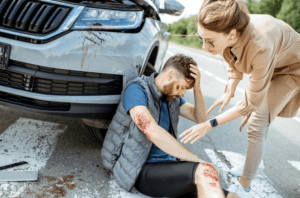
Let’s say you have been running errands on a busy Saturday and decided to stop for lunch. Walking into the restaurant, the person in front of you suddenly collapses. What do you do? What should you do? What if you try to help with good intentions, but something goes wrong? Does that mean you should stay out of it and just call 911? But what if the person isn’t breathing and you know CPR could help?
There are many questions surrounding situations just like this, with people afraid to put themselves in a scenario that could result in them getting sued. And, it’s understandable. But with Florida’s Good Samaritan Law, there is no need to continue asking yourself these questions or hesitate to do a good deed out of fear. Here’s what you need to know.
Florida Statute 768.13
Florida’s Good Samaritan Law, also known as Florida Statute 768.13, states the following:
“(2)(a) Any person, including those licensed to practice medicine, who gratuitously and in good faith renders emergency care or treatment either in direct response to emergency situations related to and arising out of a public health emergency declared pursuant to s. 381.00315, a state of emergency which has been declared pursuant to s. 252.36 or at the scene of an emergency outside of a hospital, doctor’s office, or other place having proper medical equipment, without objection of the injured victim or victims thereof, shall not be held liable for any civil damages as a result of such care or treatment or as a result of any act or failure to act in providing or arranging further medical treatment where the person acts as an ordinary reasonably prudent person would have acted under the same or similar circumstances.”
Understanding the Good Samaritan Law
This law was enacted to protect those who may feel reluctant to help even when they know it is needed. As stated, these individuals shall not be held liable should something go wrong.
Medical professionals and health professionals can help out when they see a need without worrying about getting in trouble or being sued. They are protected from being sued if they act out with good intentions and not recklessly. That means not putting the injured person at risk of another injury.
There are a couple of exceptions to the law. A good Samaritan may be held liable in a couple of instances, including:
● An injured party relied on the good Samaritan and suffered an injury.
● The good Samaritan acts carelessly and increases the injury or harm to the person.
Drug Overdoses and the Good Samaritan Law
In addition to the above, Florida’s Good Samaritan Law protects those seeking medical attention due to a drug overdose. The one who is helping an overdosed individual will receive immunity from a simple drug possession charge.
Not being able to seek help when drugs are involved costs lives. This law helps to save them.
Protection from Legal Actions
A good Samaritan that has jumped in to help someone in an emergency is protected by this law. Unfortunately, that doesn’t always stop the other party from trying to take action.
If you have helped someone and are now being sued, it is time to hire a lawyer to defend your rights. Contact us to review your case at info@winstonlaw.com or 954-475-9666.

